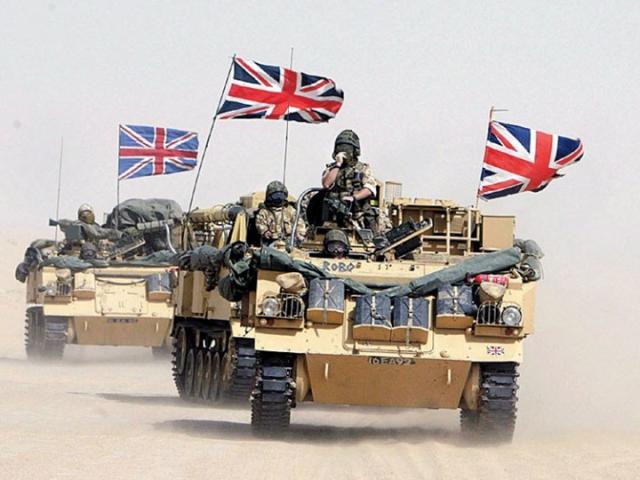Although drone attacks against terrorist leaders in the Middle East have been largely associated with American strategy, it’s worth noting that other countries, including Britain, have also engaged in this approach. On March 13th, British Defense Secretary Ben Wallace announced that the Royal Air Force had targeted a key ISIS terrorist using a military drone on December 20th in Al-Bab, northern Syria. This announcement invites a closer look at the British approach to combating terrorism in the region and prompts questions about its distinguishing features.
Growing Concerns
There is a growing concern about the various security threats facing Britain both domestically and externally. The ongoing Russian-Ukrainian war, now entering its second year, represents the most significant security threat to European countries since the end of World War II. Additionally, Britain has prioritized confronting the Chinese challenge as one of its top priorities. However, the current British government remains focused on confronting terrorist organizations in the Middle East, despite the success of the international coalition in defeating ISIS. Britain contributed to military operations that led to the defeat of the terrorist organization after it had controlled vast areas of Iraq and Syria.
British Prime Minister Rishi Sunak announced the “Integrated Review 2023,” which was presented by Foreign Secretary James Cleverly in the House of Commons. The review highlighted that terrorist organizations in the Middle East remain a threat to British security and the interests of the United Kingdom abroad. These organizations continue to expand in unstable regions such as Afghanistan and the African Sahel. As a result, the review does not dismiss the possibility of a significant resurgence of activity by these terrorist organizations.
Key Determinants
The British strategy to confront terrorism in the Middle East involves several key determinants, including:
- A focus on extremist threats: In February of last year, a review of the UK’s counterterrorism program “Prevent,” which had faced accusations of spying on British Muslims, concluded that the program must concentrate its efforts on the domestic Islamic extremist threat. William Shawcross, who was appointed as an independent reviewer of the program in January 2021, believes that “Prevent” is not doing enough to target non-violent Islamic extremism and local extremists who can create an environment that leads to terrorism. In November of last year, Ken McCallum, the head of the British intelligence agency MI5, emphasized that Islamist extremists remain a significant security concern for the UK.
- One crucial element of the British strategy to confront terrorism in the Middle East is its military support for local forces. As part of the wider Western strategy of transferring the responsibility of combating terrorist organizations to Arab countries, British soldiers have worked with partners in the international coalition to train around 225,000 members of the Iraqi security forces. Last August, the United Kingdom confirmed its continued support for the Iraqi and Peshmerga forces in their fight against terrorist organizations, particularly ISIS. Despite significant progress made against ISIS, the group still poses a significant threat to the security and stability of Iraq, as well as several other countries in the Middle East and beyond. The British military’s role in training and supporting local forces is thus crucial to the overall success of the counterterrorism effort in the region.
- The disruption of terrorist financing sources is a key element of the British strategy to combat terrorism in the Middle East. The British government recognizes the importance of cutting off the funding of terrorist organizations in order to defeat them. To achieve this goal, the UK cooperates with regional countries and partners in the international coalition to prevent ISIS and other groups from accessing official financial systems and informal financing networks. Additionally, the UK participates in disrupting the economic infrastructure of ISIS in Iraq, Lebanon, and Turkey, and conducts targeted military strikes against the infrastructure that the group controls, which is its main source of income. The UK also works with its coalition partners to prevent ISIS from benefiting from the illicit trade in antiquities seized from Syria and Iraq, which still funds its terrorist activities. These efforts demonstrate the UK’s commitment to combatting the financial foundations of terrorism and to preventing these organizations from acquiring the resources they need to carry out their operations.
- Targeting terrorist leadership operations: The targeting of a prominent terrorist leader by the Royal Air Force on December 20th, 2022, in the northern Syrian city of Al-Bab was not the first operation carried out by Britain against ISIS-affiliated terrorists in the region. In fact, there have been multiple strikes in the past year, including an attack on October 10th, 2022, when a terrorist was targeted while riding a motorcycle in northern Syria. Prior to that, on June 14th, 2022, Royal Air Force planes joined coalition forces in targeting terrorists affiliated with the organization who were attempting to re-establish their presence in an area north of Tikrit. The repeated targeting of ISIS-affiliated terrorists by the British military raises questions about the effectiveness of these operations in weakening the group’s presence in the region.
- Supporting stability efforts in liberated areas: The British government is actively working to assist Arab countries facing internal crises and maintain stability in areas hosting refugees, who are often one of the primary sources of funding for terrorist organizations. As stated on the website of the International Coalition, the UK has committed to providing roughly 3.3 billion pounds sterling in aid to Syria and its neighboring countries hosting refugees, making it one of the world’s most significant donors. Furthermore, the UK has allocated 272 million pounds sterling for humanitarian assistance in Iraq, providing essential needs and healthcare to thousands of displaced families. These efforts are crucial in helping to mitigate the destabilizing effects of the refugee crisis and reducing the potential for terrorist organizations to exploit the situation for their benefit.
- Participation in combat operations: According to estimates, the British Royal Air Force has carried out over 5,500 combat missions and fired more than 4,300 missiles as part of the international coalition’s operations to defeat the terrorist organization ISIS. In contrast to US military strikes, which have often resulted in civilian casualties, British military operations against terrorist organizations in the region take great care not to harm civilians. Defense Secretary Wallace has stated that the drone operators who targeted the terrorist leader on December 20th reduced the potential risks to civilians. The website of the international coalition indicates that nearly 1,400 British soldiers are involved in anti-ISIS operations in the region.
- The involvement of numerous British citizens in terrorist activities has prompted British security authorities to take several measures to arrest them under various counter-terrorism laws and bring them to trial. One such arrest occurred on August 11th of last year when Ayman Davis (29) was arrested at an airport upon his return from Turkey. Davis was a member of the “Beatles” cell affiliated with ISIS, which operated in Syria between 2012 and 2015. The cell is accused of supervising the detention of at least 27 journalists and humanitarian workers from various countries. His trial began on February 27th, and Davis is being prosecuted on charges related to financing terrorist activities and possessing weapons for terrorist purposes.
Continuous Criticisms
Although the United Kingdom has achieved multiple successes in adopting individual and collective measures with its Western and Middle Eastern partners to confront the growing phenomenon of terrorism in the region, its approach to counterterrorism has faced criticism for potentially unintended consequences. Specifically, the UK has been criticized for its failure to repatriate former members of the organization from Syrian camps, unlike other Western countries such as France, Spain, Australia, and Canada. There are growing concerns about the loss of the Syrian local forces’ ability to maintain security and order in detention camps, especially the al-Hol camp in northern Syria.


